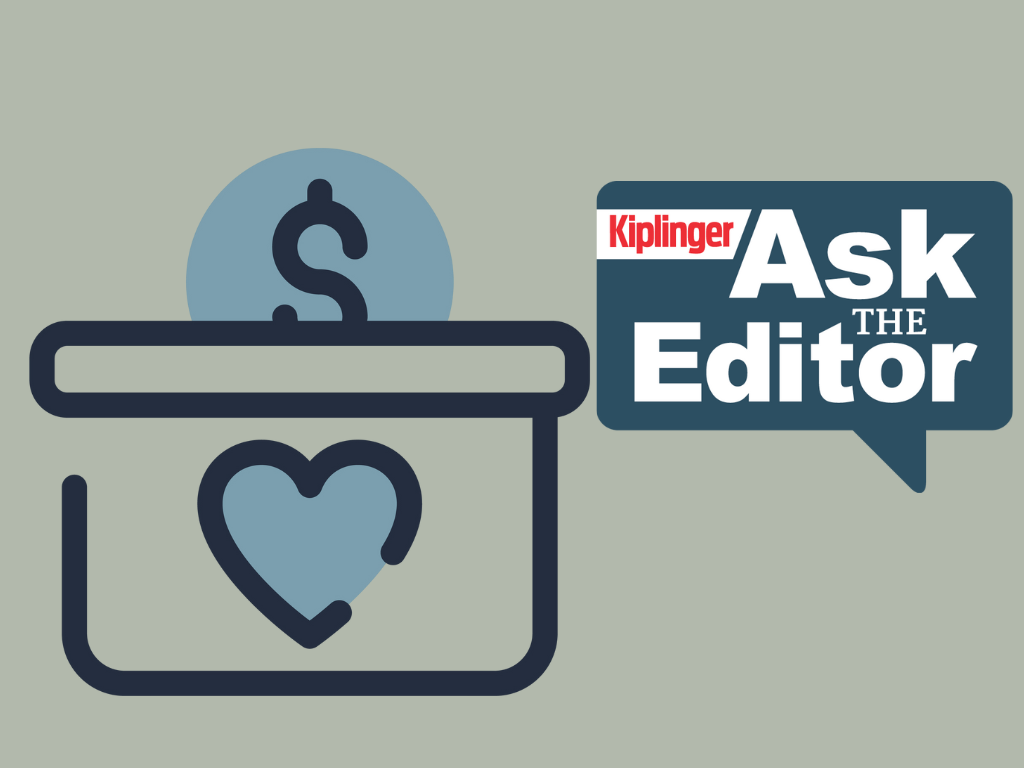Make Sure You're Covered if an Earthquake Strikes
Standard homeowners policies won't pay for damage due to earthquakes. Find out how to fill the holes in your coverage.

Profit and prosper with the best of Kiplinger's advice on investing, taxes, retirement, personal finance and much more. Delivered daily. Enter your email in the box and click Sign Me Up.
You are now subscribed
Your newsletter sign-up was successful
Want to add more newsletters?

Delivered daily
Kiplinger Today
Profit and prosper with the best of Kiplinger's advice on investing, taxes, retirement, personal finance and much more delivered daily. Smart money moves start here.

Sent five days a week
Kiplinger A Step Ahead
Get practical help to make better financial decisions in your everyday life, from spending to savings on top deals.

Delivered daily
Kiplinger Closing Bell
Get today's biggest financial and investing headlines delivered to your inbox every day the U.S. stock market is open.

Sent twice a week
Kiplinger Adviser Intel
Financial pros across the country share best practices and fresh tactics to preserve and grow your wealth.

Delivered weekly
Kiplinger Tax Tips
Trim your federal and state tax bills with practical tax-planning and tax-cutting strategies.

Sent twice a week
Kiplinger Retirement Tips
Your twice-a-week guide to planning and enjoying a financially secure and richly rewarding retirement

Sent bimonthly.
Kiplinger Adviser Angle
Insights for advisers, wealth managers and other financial professionals.

Sent twice a week
Kiplinger Investing Weekly
Your twice-a-week roundup of promising stocks, funds, companies and industries you should consider, ones you should avoid, and why.

Sent weekly for six weeks
Kiplinger Invest for Retirement
Your step-by-step six-part series on how to invest for retirement, from devising a successful strategy to exactly which investments to choose.
A 5.9 magnitude earthquake hit the East Coast today and could be felt in Washington, D.C., New York, Boston and to the west in Cleveland, Ohio. It's good reminder that disaster can strike anywhere at any time and that you should take steps now to be prepared. The first thing you should do is make sure you have enough insurance coverage to avoid being wiped out financially.
About 5,000 earthquakes strike each year, yet standard homeowners policies do not cover earthquake damage, according to the Insurance Information Institute (III). To get coverage, you'll need to add an endorsement to your existing policy or buy a separate earthquake policy, which is available from private insurers or the California Earthquake Authority if you live in that state.
The endorsement or policy will cover damage from shaking and cracking (damage from fire or water from broken pipes will be covered under your homeowners policy). Earthquake insurance rates will vary by area, insurer and type of structure being insured (brick homes are more costly to insure). Deductibles for these policies range from 2% to 20% of the replacement value of the home, according to III.
From just $107.88 $24.99 for Kiplinger Personal Finance
Become a smarter, better informed investor. Subscribe from just $107.88 $24.99, plus get up to 4 Special Issues

Sign up for Kiplinger’s Free Newsletters
Profit and prosper with the best of expert advice on investing, taxes, retirement, personal finance and more - straight to your e-mail.
Profit and prosper with the best of expert advice - straight to your e-mail.
Even if you don't live in an earthquake-prone area, you might have gaps in your homeowners coverage that could leave you unprotected if another disaster, such as a flood, wildfire, major storm or tornado, were to strike. Most homeowners mistakenly think that their homeowners insurance covers more losses than it really does, according to a study by the National Association of Insurance Commissioners.
Among the types of damage not covered by a standard policy are flooding and sewage backup. And coverage for valuables, such as jewelry and antiques, and liability protection (if someone is injured at your home) is limited. Below are several articles with advice on how to fill the gaps in your coverage and prepare before disaster strikes.
Learn what your insurance policies do -- and don't -- cover.
Nearly two-thirds of homeowners are underinsured. Make sure you're not one of them.
Prepare for Storm Season With Flood Coverage
Your homeowners policy won't pay for damage caused by rising water. Here's how to get the coverage you need.
Prepare Your Homeowners Insurance for Hurricane Season
Now is the perfect time to review your coverage to make sure your home is protected.
Other steps to take
In addition to having adequate insurance coverage, you also need to make sure that you're prepared to file a claim and that you have enough cash to cover costs until your insurer reimburses you.
Take inventory. You need to know what you have in your home -- and the replacement value of those items -- so you can file an insurance claim. Take photos of possessions or videotape your home room by room. Store the proof on a CD or flash drive and put it in a safe place. See Tips to Help You File an Insurance Claim for more information. And to find out how insurers handle storm-damage claims, see Protection After the Storm.
Build an emergency fund. Set aside several thousand dollars in a money-market or savings account to cover potential out-of-pocket costs. Many common storm-related expenses -- such as removing fallen trees, which can cost thousands of dollars -- generally aren't covered unless the tree lands on your house.
Profit and prosper with the best of Kiplinger's advice on investing, taxes, retirement, personal finance and much more. Delivered daily. Enter your email in the box and click Sign Me Up.

Award-winning journalist, speaker, family finance expert, and author of Mom and Dad, We Need to Talk.
Cameron Huddleston wrote the daily "Kip Tips" column for Kiplinger.com. She joined Kiplinger in 2001 after graduating from American University with an MA in economic journalism.
-
 Ask the Editor: Questions on Tax Breaks for Caregivers
Ask the Editor: Questions on Tax Breaks for CaregiversAsk the Editor In this week's Ask the Editor Q&A, Joy Taylor answers questions on tax breaks for caregivers
-
 Are You Making These Savings Mistakes?
Are You Making These Savings Mistakes?Avoiding these common mistakes can help you build a foundation of wealth while not leaving thousands of dollars on the table.
-
 I See the Freedom in My Friend's Late-Life Divorce
I See the Freedom in My Friend's Late-Life DivorceHaving gone through a divorce myself, I know it can bring financial and emotional peace in the long run.
-
 Five Ways to Save on Vacation Rental Properties
Five Ways to Save on Vacation Rental PropertiesTravel Use these strategies to pay less for an apartment, condo or house when you travel.
-
 How to Avoid Annoying Hotel Fees: Per Person, Parking and More
How to Avoid Annoying Hotel Fees: Per Person, Parking and MoreTravel Here's how to avoid extra charges and make sure you don't get stuck paying for amenities that you don't use.
-
 How to Appeal an Unexpected Medical Bill
How to Appeal an Unexpected Medical Billhealth insurance You may receive a bill because your insurance company denied a claim—but that doesn’t mean you have to pay it.
-
 Amazon Prime Fees Are Rising. Here’s How to Cancel Your Amazon Prime Membership
Amazon Prime Fees Are Rising. Here’s How to Cancel Your Amazon Prime MembershipFeature Amazon Prime will soon cost $139 a year, $180 for those who pay monthly. If you’re a subscriber, maybe it’s time to rethink your relationship. Here’s a step-by-step guide to canceling Prime.
-
 How to Haggle for Almost Anything
How to Haggle for Almost AnythingSmart Buying Learning how to haggle is an invaluable skill. These strategies will help you negotiate a better price for just about any product or service.
-
 Disability Insurance Can Provide COVID Coverage
Disability Insurance Can Provide COVID CoverageCoronavirus and Your Money If you are concerned about long-term complications from COVID-19, consider disability insurance coverage.
-
 21 Things You Can't Return to Amazon — Either Online or In-Store
21 Things You Can't Return to Amazon — Either Online or In-StoreDid you know there are things you can't return to Amazon? Before adding these 21 items to your cart, be sure to read Amazon's return policy first.
-
 How to Avoid a Charity Scam
How to Avoid a Charity Scampersonal finance Scammers never quit, even when you're trying to be altruistic. But you can avoid getting duped if you do your homework.